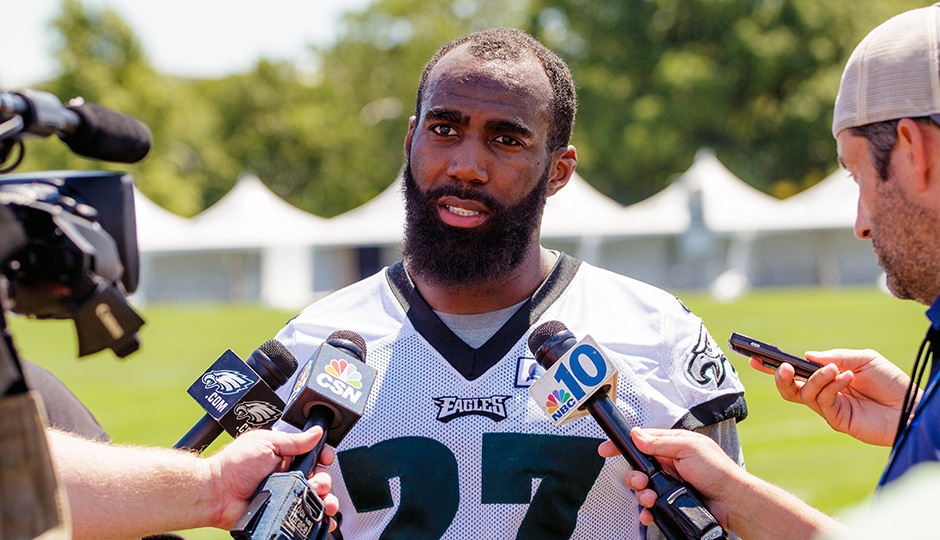Jenkins: ‘Lane [Johnson] Reads Too Many Articles’

Malcolm Jenkins. (Jeff Fusco)
After Lane Johnson said yesterday that the tension between Chip Kelly and Howie Roseman trickled down to the locker room, Malcolm Jenkins fired back today.
“I think Lane reads too many articles,” Jenkins said. “For whatever anybody in the front office has going on, it should never bother anybody in the locker room. That’s not something that we ever saw or dealt with, so if he felt it, that’s probably because he’s reading too many of those articles.”
Jenkins also talked extensively about whether Kelly was “unapproachable,” which Johnson said was how some players may have felt.
“A lot of the times, some players you’ll ask them if they felt like Chip was approachable and their answer might be no, but they’ve probably never approached Chip,” Jenkins said. “As a player who’s talked to Chip and been to his office and had candid conversations, he has an open door policy. He’ll hear what you’re saying and he takes it serious. I know he cares about his players and cares about everyone in this locker room.
“Unfortunately, that relationship — for whatever reason — took a lot of work. I don’t know if it was strained, I don’t know if he ever lost the locker room, but it took work. And you want it to be a little bit more cohesive.”
Jenkins added that he didn’t view Kelly as unapproachable, but that the former coach’s relationship with his players could have been better.
“Communication between players and Chip probably wasn’t the best and I think it was probably on the fault of both parties,” Jenkins said. “People seem to think Chip is unapproachable and a little standoffish, but in reality — if you ever go talk to him — he has an open door policy. He’s willing to talk to anybody, so I think the perception was not necessarily the reality.”
Jenkins said earlier the season that players could’ve been held more accountable, and he mentioned today that it remained a problem after that.
“There’s a balance of ripping guys and we have a schedule we wanted to keep,” Jenkins said. “Our meetings were always separate. Like I said before, there’s different ways to do it. I still think that that’s some area we can be better at is holding guys accountable, but you got different ways of doing that. He tries to keep some guys’ confidence high; he doesn’t want to destroy players.
“It’s already hard enough to kind of play in this city when you’re playing bad. When you’re talking about confidence and positive reinforcement, there’s enough negatively flying around. I don’t think he wanted to add anymore to the fire.”
Jenkins added that he likely felt more comfortable voicing his displeasure than others because of how much money he makes and his status on the team. He also explained how Kelly could have used the team leaders better.
“I think that’s more where Chip probably could’ve did a better job, is just he had leaders on the team he can use to get a feel for the pulse of the locker room and to be the voice of the locker room,” Jenkins said. “I don’t think he utilized that enough or was proactive enough to really connect to the players. It was really, ‘If you have something, come to me,’ but from a players standpoint, sometimes that’s hard. I think he’s got to have a little bit more of a proactive approach to engage with players and see where their mind is at.”
Jeffrey Lurie said yesterday that he’ll consult players in what they want in their next head coach, and Jenkins emphasized that he wanted somebody who held players accountable and developed a good culture.
“I think Chip had great intentions, I just think the delivery was one that wasn’t always accepted because I believe you have to fill the locker room with great guys who may not be the most talented, but play well as a team,” Jenkins said. “When you hold them accountable, you allow your team to basically become the coaches and your leaders lead the locker room.
“Once you have that, everybody’s bought in. And then it’s just the coach can stand back and just talk ball and you let your leaders keep everybody in line. When it’s the coach constantly keeping everybody in line [and] your leaders don’t have a big role, it’s tough to be a cohesive team.”